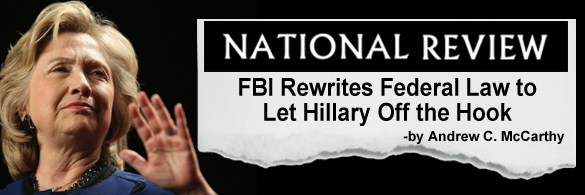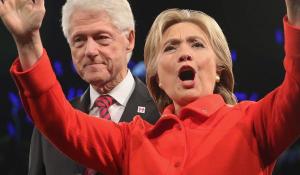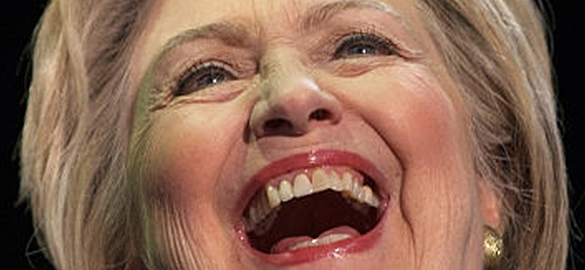TOOBIN: It’s an enormous relief for Hillary Clinton and her campaign! This was a dagger aimed at the heart of her campaign, and she has avoided being charged. Simple as that. I also think it is worth focusing on what Director Comey said about the nature of these sorts charges. These cases have only been brought when there has been knowing and intentional violation of the rules of classified information. Here, the issue of intent is critical. She has said publicly — undoubtedly she said in her interview — that she never intentionally disclosed classified information. The FBI found nothing to refute that. And that’s why she wasn’t charged.
 RUSH: Man, oh, man! You know, isn’t it interesting how the whole issue of intent seems to be relevant when it involves Democrats in government? So does this mean that they discovered that Petraeus intended to share classified information with his mistress and that that’s why they got him? That’s why they got him, because he intended to imperil the security of the US? Comey said that she was sending out top secret emails that were both marked and unmarked. How can you not know? How can you be so ignorant? Is this a defense? Well, in Hillary’s case, yeah.
RUSH: Man, oh, man! You know, isn’t it interesting how the whole issue of intent seems to be relevant when it involves Democrats in government? So does this mean that they discovered that Petraeus intended to share classified information with his mistress and that that’s why they got him? That’s why they got him, because he intended to imperil the security of the US? Comey said that she was sending out top secret emails that were both marked and unmarked. How can you not know? How can you be so ignorant? Is this a defense? Well, in Hillary’s case, yeah.
I guess she’ll be as ignorant as the day is long if it avoids an indictment or charges, ’cause at the end of the day the bottom line’s what counts, and she’s scot-free here. But, for crying out loud, how can somebody eminently qualified to be secretary of state not know what she’s doing? Is that gonna be the defense? If you listen to Toobin here, it sounds like that’s what they’re gonna hang their hat on. Well, you know, Comey couldn’t find any evidence that she meant to do this. Really? That’s the positive? That’s what’s supposed to relieve us of any concern? Oh, the fact is that she did send classified does data, but she didn’t mean to! That makes it okay; that makes it all better.
How many times have you heard…?
I know this might be a specific case, and even though my dad was a lawyer, I’m not, and I probably will be corrected on this. But it just seems to me that we hear all the time that lack of intent is no shield. “It doesn’t matter whether you intended to do this or not. You still did it.” I can’t tell you number of times I’ve heard people say that and had people explain to them, “The fact you didn’t know… Ignorance of the law, the fact he didn’t intend it? Sorry, sir. It’s of no concern. You committed the act.” How could she not…? This whole business of intent… “Well, I didn’t intend to send classified data!” Well, who would admit that they ever did?
Anyway, that’s what I said.
This case is not over in the political sense, and it’s gonna require some work to keep up.
BREAK TRANSCRIPT
RUSH: I checked the relevant statute here during the break, and at first I thought it doesn’t say anything about intent. And I kept reading, and it does. The statute it involved here, 18 US Code 793: “Gathering, transmitting or losing defense…” It does mention intent, so it is required as part of this particular statute. And I just wanted to confirm that. Still weird.
BREAK TRANSCRIPT
RUSH: But back to McCarthy here. “There is no way of getting around this: According to Director James Comey –” and he discloses that Comey is a former colleague and longtime friend. Andy knows Comey. Andy knows Pat Fitzgerald. And, to get it all on the table, Andy McCarthy and Pat Fitzgerald together tried the blind sheik. They go back a long way, so there is personal knowledge as well here. Victoria Toensing, by the way, who’s the wife of Joe diGenova, who was the first to say the FBI had the goods. Remember that way back, a couple, three four months ago, diGenova came out and said he’d been talking to people in the FBI, they’ve got evidence and if she’s not indicted, there are gonna be so many people down in the dumps they’re gonna resign. Remember that? I do.
 And I thought at the time, “Well, that’s a big stretch. To say that now, there must be something to it. If you’re gonna be a public commentator, go out on a limb with something like that, that they’ve got the goods on her, that it’s open, shut, slam dunk, and that if there is not an indictment, that a lot of investigators at the FBI are gonna throw their hands up and quit, that’s what diGenova said. Now, I don’t recall if he said if Comey doesn’t recommend charges they would — He might have said that as well. I’ll have to go back and check.
And I thought at the time, “Well, that’s a big stretch. To say that now, there must be something to it. If you’re gonna be a public commentator, go out on a limb with something like that, that they’ve got the goods on her, that it’s open, shut, slam dunk, and that if there is not an indictment, that a lot of investigators at the FBI are gonna throw their hands up and quit, that’s what diGenova said. Now, I don’t recall if he said if Comey doesn’t recommend charges they would — He might have said that as well. I’ll have to go back and check.
But his wife is Victoria Toensing. And was this a tweet? Oh, it’s an email. She said: “Comey brought in Fitzgerald for the Scooter investigation, and they’re friends as they were prosecutors in New York together.” So she’s making the case that Comey and Fitzgerald are good buddies, and both were said to be clean and pure as the wind-driven snow, above the law, you can totally trust ’em, straight shooters and all that. That’s Victoria Toensing. I’m just reporting. All kinds of stuff’s rolling in here, folks. There are a lot of people, there are a lot of people, like diGenova, they threw it all out there. They pretty much told us that the goods are there, the FBI got the evidence, and if there’s no indictment, well, you’re gonna see mass resignation and so forth.
So the point is, a lot of people, despite what I warned ’em, a lot of people thought that today was going to be bring the announcement of an indictment. Well, a recommendation that charges be brought. So Andy here disclosing that Comey’s a buddy, former colleague, and a longtime friend.
Hillary Clinton checked every box, there’s no way of getting around this, and according to what Comey said, “Hillary Clinton checked every box required for a felony violation of Section 793(f) of the federal penal code (Title 18): With lawful access to highly classified information she acted with gross negligence in removing and causing it to be removed from its proper place of custody, and she transmitted it and caused it to be transmitted to others not authorized to have it, in patent violation of her trust.” Yes. Amen. Who cares about intent; what did she say actually do? I mean, that’s the common sense reaction here.
You know I heard Toobin on CNN (paraphrasing), “Well, the way she got off the hook here is, according to the FBI director, she didn’t intend to do anything.” Well, when does that start mattering? This is my intelligence guided by experience. When does that start mattering all of a sudden? I had no idea that even at that moment McCarthy was preparing his piece.
 “Director Comey even conceded that former Secretary Clinton was ‘extremely careless’ and strongly suggested that her recklessness very likely led to communications (her own and those she corresponded with) being intercepted by foreign intelligence services. Yet, Director Comey recommended against prosecution of the law violations he clearly found on the ground that there was no intent to harm the United States.”
“Director Comey even conceded that former Secretary Clinton was ‘extremely careless’ and strongly suggested that her recklessness very likely led to communications (her own and those she corresponded with) being intercepted by foreign intelligence services. Yet, Director Comey recommended against prosecution of the law violations he clearly found on the ground that there was no intent to harm the United States.”
You go back, we got the sound bites coming up, too, of Comey when you listen from the beginning, you think my gosh, it sounded serious when he started out. Did you hear it all from the beginning in there, Mr. Snerdley? It sounded serious. I mean, my first reaction, my gosh, I was wrong. He’s got the goods and is gonna proceed and lay it out. And as it went on, that clearly was not what was gonna happen.
“In essence, in order to give Mrs. Clinton a pass, the FBI rewrote the statute, inserting an intent element that Congress did not require. The added intent element, moreover, makes no sense: The point of having a statute that criminalizes gross negligence is to underscore that government officials have a special obligation to safeguard national defense secrets; when they fail to carry out that obligation due to gross negligence, they are guilty of serious wrongdoing. The lack of intent to harm our country is irrelevant. People never intend the bad things that happen due to gross negligence.
“I would point out, moreover, that there are other statutes that criminalize unlawfully removing and transmitting highly classified information with intent to harm the United States. Being not guilty (and, indeed, not even accused) of Offense B does not absolve a person of guilt on Offense A, which she has committed. It is a common tactic of defense lawyers in criminal trials to set up a straw-man for the jury: a crime the defendant has not committed. The idea is that by knocking down a crime the prosecution does not allege and cannot prove, the defense may confuse the jury into believing the defendant is not guilty of the crime charged.
“Judges generally do not allow such sleight-of-hand because innocence on an uncharged crime is irrelevant to the consideration of the crimes that actually have been charged. It seems to me that this is what the FBI has done today. It has told the public that because Mrs. Clinton did not have intent to harm the United States we should not prosecute her on a felony that does not require proof of intent to harm the United States.”
In other words, there are two statutes at play here. One requires intent; the other does not. The statute that does not require intent is enough, but they’re not using it. They’re relying on some other statute that does require intent, and they’re adding that to the statute that doesn’t, in a sense, as a means of protecting her. That’s what the FBI’s done today. It has told the public that because Mrs. Clinton did not have intent to harm the US we should not prosecute her on a felony that does not require proof of intent to harm the US.
“Meanwhile, although there may have been profound harm to national security caused by her grossly negligent mishandling of classified information, we’ve decided she shouldn’t be prosecuted for grossly negligent mishandling of classified information. I think highly of Jim Comey personally and professionally, but this makes no sense to me. Finally, I was especially unpersuaded by Director Comey’s claim that no reasonable prosecutor would bring a case based on the evidence uncovered by the FBI.
“To my mind, a reasonable prosecutor would ask: Why did Congress criminalize the mishandling of classified information through gross negligence? The answer, obviously, is to prevent harm to national security. So then the reasonable prosecutor asks: Was the statute clearly violated, and if yes, is it likely that Mrs. Clinton’s conduct caused harm to national security? If those two questions are answered in the affirmative, I believe many, if not most, reasonable prosecutors would feel obliged to bring the case.”
I was gratified to see this piece that Andy wrote because this intent still has me buffaloed. Who cares if she intended to put US national security at risk? Who does? But the fact of the matter that the statute says gross negligence. Gross negligence and lack of intent are the same thing. Gross negligence, if you’re just so willfully unaware, if you don’t care, if you are so unattached that you are not aware what you do, that’s gross negligence. That’s the statute. How can you intend not to dare? How can you intend to be negligent? You just are.
So these statutes contradict each other. And McCarthy’s point is that this has selective application of a statute that in her case doesn’t apply. It’s taking the intent statute that does require intent, moving it over to the area in which she has transgressed and applying it where Congress doesn’t. This strangely sounds very similar to what Chief Justice John Roberts did with Obamacare. He said to himself, you know, I just don’t think — and I think he either admitted this or somehow it came out that the chief justice said I’m not comfortable, I’m not comfortable judging something here to be unconstitutional that has been duly passed by the elected representatives of the people, I just don’t find a comfort level doing that. So he rewrote it in a sense.
Remember when that Obamacare decision came out and the first couple sentences of the decision were read, and everybody thought that they had just found it unconstitutional. And then you keep reading and you find out that the actual law had been adjusted at the court. It was all about whether the government can tax and force people to buy, consumers to buy a product. The Fourth Amendment says they can’t. So the way to get around it is to call it a tax. They have the federal power to tax.
It was a convoluted mess. And it was all resulting from the fact that the chief judge, chief justice did not want to find something so paramount, so big, so important to be unconstitutional, so he found a way to make it constitutional. And it sounds eerily similar here to where they looked and looked and looked and tried to do everything they could to avoid charging her for what she did.
She was grossly negligent in handling classified top secret information. And to exonerate her because she didn’t intend to? Let me know the next time any of you ever charged with a crime are allowed to skate on it because you didn’t know, or you didn’t intend to do what you did. Let me know how that works for you. ‘Cause I don’t know of it working for anybody.
BREAK TRANSCRIPT
RUSH: Tom in Duluth, Minnesota. Great to have you with us, sir. Hi.
CALLER: Oh, thank you, Rush. First-time caller, longtime listener.
RUSH: It’s great to have you with us. What’s up? What’s shaking?
 CALLER: I want to give you a little bio. I’ve been an attorney for 40 years. I was a JAG officer, initially. I both prosecuted and defended people. After I got out of the Navy, I continued to do that. In the first year of law school, you take a criminal law class, and they teach you the difference between general intent and specific intent crimes. The majority of crimes are general intent. That’s what this is. That’s what she violated.
CALLER: I want to give you a little bio. I’ve been an attorney for 40 years. I was a JAG officer, initially. I both prosecuted and defended people. After I got out of the Navy, I continued to do that. In the first year of law school, you take a criminal law class, and they teach you the difference between general intent and specific intent crimes. The majority of crimes are general intent. That’s what this is. That’s what she violated.
She had the intent to do what she did. Whether she intended to violate the laws and commit whatever she did is unimportant. It’s sort of like if a person gets drunk and intends to get drunk, and then runs over a bunch of people to kill ’em. You don’t have to prove that he intended to kill those people. He did it. That was sufficient. So the thing that distresses me most here is that a prosecutor is supposed to see that justice is done.
And in this case, I think the least they could have done is presented this to a grand jury, and let a jury decide. If the grand jury decided to indict, that let a jury decide. I mean, that’s what the law is all about, and I just can’t see where he can mind-read what this shows. In my mind, it looks like something that at least should go to trail — and if she’s not guilty, she’s not guilty. But I just can’t believe he’s not at least taking it that far. So, those are just my comments.
RUSH: Well, even in your scenario, he presents a case and recommends that what? She be prosecuted? Or would he recommend a grand jury, a federal grand jury? What? To get —
CALLER: Well, he would… That would… I think there’s two steps. I think he could either recommend that it go to the grand jury or there’s another route, but I would think the grand jury would be the one to use.
RUSH: (sigh) Well, you know, I’m becoming extremely cynical, and you’re speaking as an officer of the court where the intention here is to actually find out what happened. And that’s not what we’re dealing with here. We are dealing with a politicized DOJ. There’s no question about this. We are dealing with a politicized Department of Justice, where the last thing it wants to get to is what you suggested. Their objective is to shield her. Now, I know Comey’s reputation is what it is. But, I’m sorry, I don’t know how you conclude anything else given what he also said!



